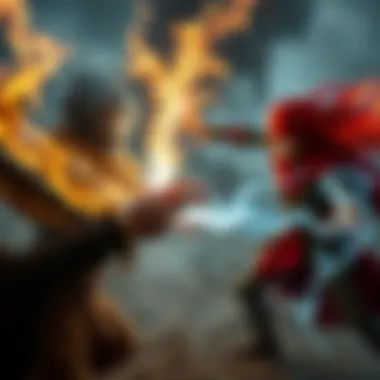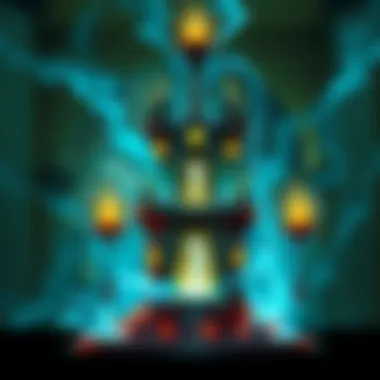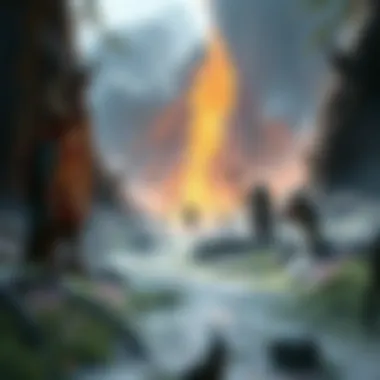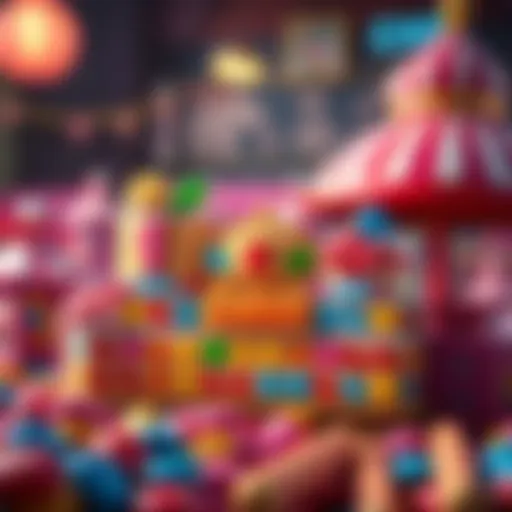The Intricate Art of Magic in Role-Playing Games


Intro
Magic is often that special ingredient that transforms the ordinary into the extraordinary in role-playing games (RPGs). From the sparks of fireballs to the whispers of ancient tomes, magic instills life into the narratives we dive into. Not only does it serve as a means to overcome obstacles in gameplay, but it shapes the very fabric of these immersive worlds. As we embark on this exploration, we'll uncover how magic has evolved, its complex mechanics, and the narrative significance it brings to RPGs. It's a journey that combines art, culture, and an entire universe of creativity—all wrapped up in a dazzling package.
Game Feature Spotlight
Unique Gameplay Mechanics
In many RPGs, magic systems take center stage, influencing how players interact with the game environment. Each title approaches magic through its distinct lens. For example, in Dungeons & Dragons, spell slots and casting times dictate a sorcerer's ability to unleash potent spells at pivotal moments, rendering strategy just as crucial as raw power. On the other hand, games like Final Fantasy introduce the materia system, allowing players to customize abilities at their own pace, which gives more versatility.
- Spell Components: Some games, like Pathfinder, require specific items for spellcasting, adding another layer of strategy and planning for players.
- Cooldown Mechanisms: Titles like World of Warcraft often feature cooldowns to prevent repeated use, ensuring a balance between skill and reliance on magical powers.
Magic mechanics not only diversify gameplay but also engage players mentally, prompting them to weigh the risks and rewards associated with their magical choices.
Art Style and Design
The artistic representation of magic in RPGs is equally captivating. Titles vary wildly in how they visualize magical elements. In The Elder Scrolls V: Skyrim, the effects of spells are often gritty and realistic, enhancing the sense of immersion in a harsh yet beautiful world. Conversely, Ni no Kuni presents a whimsical interpretation of magic, using vibrant colors and charming animations that appeal to players of all ages.
A well-designed user interface plays a critical role here. Clear visuals and intuitive menus allow players to navigate their magical capabilities effectively, keeping them immersed in the game world without breaking tempo.
Storyline and Characters
Characters wielding magic often serve as pivotal figures in RPG narratives. In The Witcher 3, Geralt of Rivia, a monster hunter, utilizes signs that perfectly blend action with storytelling, demonstrating how magic influences his interactions with both foes and allies. The incorporation of unique magical abilities often informs character arcs and motivations, making them deeper and more relatable.
Furthermore, magic can also be the catalyst for conflict. In many traditional tales, the rise or fall of great powers often hinges on the mastery of magical forces, creating compelling narratives that drive players forward.
"In RPGs, magic is not just a tool; it is the thread that weaves intricate stories and character developments into a rich tapestry of gaming experiences."
Notably, games that flesh out their world-building through magical lore tend to attract players who thrive on immersion. This marks a trend where thoughtful storytelling intertwines with gameplay mechanics, reaping rewards in player engagement.
Quirky Gaming News
Trending Updates and Announcements
As RPGs evolve, so does the magic within them. Recent updates have introduced innovative features that push the boundaries of magic systems. For example, special events in Genshin Impact are often accompanied by new elemental abilities that shake things up, keeping the player base engaged.
Industry Gossip and Rumors
Rumor has it that a well-known studio is working on a fantasy RPG with an experimental magic system. Players are eagerly awaiting any morsel of information, demonstrating how deeply integrated magic is in the community's expectations.
Unconventional Events and Collaborations
Some oddball collaborations have even emerged, merging technology and traditional magic systems. Augmented reality events that allow players to cast spells in real life have caught the imagination of many, blending fantasy with tangible experiences.
Fun Facts and Trivia
In the rich tapestry of RPG history, magic has long played a pivotal role. Here are a few noteworthy tidbits to ponder:
- The origin of magic in RPGs can be traced back to tabletop games such as Dungeons & Dragons, which formalized many concepts we now take for granted.
- Easter eggs often related to magic can be found throughout games, with hidden spells or exclusive items rewarding keen-eyed players who enjoy exploring every nook and cranny.
- Interestingly, many pro players often dabble in popular lore surrounding their favorite games, always probing where the lines of fantasy and reality blur.
Ultimately, the intricate art of magic within role-playing games continues to evolve. As developers innovate and players explore new realms filled with enchanting spells, the future of magic in gaming looks vividly radiant.
Prolusion to Magic in RPGs
Magic is often considered the beating heart of role-playing games (RPGs). It's not just a collection of spells to cast; it's a vital component that shapes gameplay, narrative, and player experiences across various RPG genres. In this discussion, we aim to delve into what makes magic a compelling aspect of RPGs, examining its history, mechanics, and its overall influence on the gaming world.
The topic of magic deserves a spotlight in any in-depth exploration of RPGs. It offers players a remarkable canvas for creativity and strategy. Be it through spellcasting, alchemy, or enchantment, each magic system introduces unique elements that can change the fabric of gameplay. Players can immerse themselves in fantastical worlds where they have the power to bend realities and conjure wonders. This immersion can boost a player’s enjoyment and investment in the game.
Magic in RPGs also acts as a bridge between character development and storytelling. It not only shapes who a character is but can also highlight moral dilemmas, relationships, and conflicts within the game's universe. Thus, understanding the role and structure of magic in these games allows for a richer gaming experience, tapping into cultural narratives and ethical questions players often confront in their quests.
Historical Context of RPGs
When examining the history of RPGs, one inevitably encounters the fascinating evolution of magic systems. The early days saw simpler mechanics shaped by tabletop games. Influential titles like Dungeons & Dragons, released in 1974, laid the groundwork for what would become a sprawling genre. Here, magic was partly based on chance, with dice rolls determining whether a spell succeeded or failed. This element of randomness was a double-edged sword, keeping players on their toes but also introducing frustration when the unexpected would occur.
As RPGs transitioned into the digital realm, from Final Fantasy to The Elder Scrolls, magic systems became more complex. Designers began to introduce intricate spell trees and customizable options that catered to diverse play styles. Players were no longer beholden to rigid frameworks; rather, they could experiment and find what suited them best, mixing and matching to create unique approaches to magic. This historical progression is crucial as it shaped our current expectations regarding magic in RPGs.
Defining Magic Mechanics


Understanding magic mechanics in RPGs isn’t just a matter of listing spells or abilities. It flows deeper into how these elements interact with the game's world and the characters within it. Magic systems can be complex or straightforward, often reflecting the game's overall tone and style.
- Resource Management: Many RPGs present magic as a finite resource. Players must manage their mana or spell slots carefully; casting powerful spells can come at a steep cost.
- Spell Customization: Some games, like Genshin Impact, allow for customization of spells using various elemental properties or combining them for powerful effects. This adds layers of strategy that engage players on multiple levels.
- Cooldown Mechanics: Cooldowns play a pivotal role in balancing magic use during gameplay. This restriction prevents players from spamming spells incessantly, fostering strategic choices for when to unleash their magical might.
- Environmental Interaction: Certain RPGs introduce mechanics where magic interacts with the environment, like creating barriers or changing terrains. This interaction not only enriches gameplay but also emphasizes the importance of positioning and strategy.
All these aspects merge to create a rich tapestry of magical experience, framing how players engage with the game, both mechanically and narratively.
Types of Magic Systems
Magic systems in role-playing games are not just a side aspect; they are central to the feel and function of the game. A well-designed magic system shapes gameplay mechanics, influence characters’ abilities, and deepen the narrative. Whether a game opts for a spell-based approach or intricately ties magic to the character's skills, the choices made in crafting these systems create rich avenues for creativity and strategy. Let's break down the distinct types of magic systems that populate the RPG landscape.
Spell-based Systems
In a spell-based system, magic often manifests through predefined spells, which characters must learn and cast. This approach resembles the structure of traditional magic as depicted in fantasy literature. Each spell typically comes with its own set of rules, including mana costs, casting times, and even conditions under which the spell can succeed or fail. For instance, in Dungeons & Dragons, players can select spells from a vast array, ranging from fireballs to healing incantations, and how they utilize these spells can drastically affect the outcome of encounters.
The appeal lies not just in the power of the spells themselves, but also in the tactical decisions players must make during gameplay. For example:
- What spell to cast?
- When to use a healing spell instead of a damage spell?
- How to manage limited resources effectively?
This system promotes not only individual strategy but also collaboration among players, as they combine their magical abilities to overcome challenges. Mind you, it can also lead to scenarios where spellbook clutter becomes unwieldy, thus muddying strategy if not properly managed.
Skill-based Magic Use
On the other hand, skill-based magic systems offer a different flavor. Instead of relying on defined spells, magic is directly tied to a character's skills. This allows players to use magic in a more organic way, based on their character’s abilities rather than a scripted list of spells. In games like The Elder Scrolls, magic proficiency grows with use, meaning characters who frequently cast healing spells or fire-based attacks become more adept at those particular forms of magic.
Such systems allow for a highly personalized experience. Players can focus on areas that interest them or are strategically advantageous. Consider this:
- A character who specializes in stealth might gain special abilities like shadowy teleportation or an invisibility enchantment that functions uniquely compared to traditional spells.
- Characters can develop hybrid abilities, seamlessly blending combat with utility, making gameplay both flexible and engaging.
Alchemy and Crafting Magics
Lastly, let's consider alchemy and crafting magics, which represent a fascinating convergence of magic and resource management. Rather than spells, players concoct potions, build magical items, or infuse resources with magical properties. Games like Final Fantasy have demonstrated this approach effectively, allowing players to mix ingredients for various effects or to create weapons imbued with elemental power.
Alchemy serves not only a practical purpose but also enhances narrative depth. Crafting allows players to discover the lore of the world through the ingredients they collect, connecting them to the environment. This can pull players deeper into the game's narrative, prompting explorations and interactions that might not come naturally.
Role of Magic in Gameplay
Magic isn't just a splash of color in role-playing games; it weaves into the very fabric of how players interact with the game world. The presence of magic fundamentally alters the gameplay dynamics, providing unique avenues for combat, exploration, and character growth.
Combat Strategies Utilizing Magic
When it comes to combat, magic serves as a double-edged sword. On one hand, it can deal devastating damage to opponents, and on the other, it can be used defensively to protect allies or create barriers. Players often find themselves navigating a battlefield where strategy hinges on the careful use of spells. For instance, a fireball can wipe out a group of lesser enemies, but it could also put the caster's allies at risk if they're too close.
In many RPGs, mage classes are designed to cast a variety of spells that enable different combat styles. For instance, characters like sorcerers might utilize quick and powerful spells designed for burst damage, while warlocks might lean more on control and curses. Synergy between magic users and melee fighters often dictates success in combat, as magic can enable powerful combos. Think of how Final Fantasy combines physical attacks with magical abilities in its turn-based system, creating strategic depth that enhances the excitement of encounters.
Magic in Exploration and Problem Solving
Magic equips players with tools that elevate their exploration experience. Imagine a character using teleportation spells to traverse vast landscapes effortlessly or conjuring light in dark dungeons. These magical abilities can open doors to previously inaccessible areas that require creativity and quick thinking to navigate.
For problem-solving, magic often poses a distinct advantage. One classic example is the ability to manipulate objects from afar using telekinesis or to charm NPCs into providing vital information. The puzzles in RPGs like The Legend of Zelda: Breath of the Wild illustrate this concept clearly, where using elemental powers can manipulate the environment, such as freezing water to create pathways. In essence, players engage with the game world in multifaceted ways that are made possible through their magical prowess, encouraging them to think outside the box.
Roleplaying and Character Development
Magic also plays a pivotal role in character development and roleplaying. Each spell or magical ability can signify significant character traits and backstories, reflecting the character’s journey and personal struggles. A character who has mastered devastating black magic might be seen as morally ambiguous, hinting at a dark past or a thirst for power.
Players often invest in magic systems that resonate with their playing style, choosing spells and abilities that align with their character’s development arc. For example, choosing healing spells may denote a nurturing character, while a fondness for destructive spells might indicate a chaotic personality. This relationship between magic and character development fosters deeper emotional connections and encourages players to immerse themselves in their characters.
Magic, therefore, is not merely a gameplay mechanic; it serves as an extension of storytelling and character evolution. Each player's experience is thus rich and varied, underscoring the indispensable role that magic plays in enhancing the overall journey within RPGs.
Narrative Significance of Magic
Magic in role-playing games often serves as a cornerstone, shaping not merely the mechanics of gameplay but also the narratives that players encounter. It’s the thread that weaves through the tapestry of rich storytelling, providing depth and context to the worlds conjured by creators and experienced by players. Magic's role transcends mere combat utility, emerging as a powerful narrative vehicle that enhances the thematic richness of RPGs.
World-Building through Magical Constructs
World-building in RPGs relies heavily on the establishment of magical systems and the lore surrounding them. Each spell, enchanted creature, or ancient artifact contributes to a unique universe, steeped in history and atmosphere. For instance, in the game Dungeons & Dragons, the inclusion of ley lines and mana-rich locations helps to flesh out environments, making them feel alive and responsive. It’s not just about what players can cast, but how these magical constructs influence the environment around them.
Consider the magic system of The Elder Scrolls V: Skyrim, where magic is deeply intertwined with the culture of Tamriel. From the ancient dragons to the mystical wards used by mages, these elements form a cohesive picture of a world where magic plays a vital role in daily life and governance. Thus, world-building through the lens of magic establishes not just lore, but creates places teeming with possibilities for adventurers eager to explore every corner of this fantastical realm.


Ethics and Consequences of Magic Use
Diving into the ethical aspects of magic usage opens a Pandora's box of dilemmas. Magic often embodies immense power, challenging the morality of those who wield it. This is particularly poignant in titles like Final Fantasy, where the use of magic can come at a great cost. For example, the Summon magic not only calls forth powerful creatures but also leaves a lasting impact on the character’s psyche and the world at large.
Players often face substantial consequences for their magical choices. As narratives unfold, characters who succumb to temptation may wield forbidden spells or manipulate reality, leading to a greater struggle against adversaries that arise due to these very actions. Magic in this context is more than a tool; it's a mirror reflecting the consequences of ambition, greed, or noble intentions gone awry, thereby enriching the narrative experience.
Magic as a Catalyst for Conflict
In RPGs, magic does not simply enhance gameplay; it ignites conflict, serving as the crucible against which characters and plots evolve. When factions clash over magical resources, or when a powerful artifact is threatened with misuse, tension mounts. Games like World of Warcraft illustrate this perfectly. Elemental magic can tip the scales in a battle, causing alliances to fracture or grow stronger.
"Mages are often those in the crosshairs of conflict, seen as either harbingers of great power or terrible desolation."
This interplay of power dynamics often leads to unpredictable outcomes, where characters can achieve heroism or meet their demise due to their relationships with magic. As new magical threats emerge, the stakes rise, and realms are plunged into crises that demand decisive action and moral integrity from players. The endless cycle of use, consequence, and conflict surrounding magic in RPGs creates a profound depth within their narratives, giving players not just stories to engage with but legacies to shape and stories to craft.
Cultural Impact of Magic in RPGs
Magic in role-playing games (RPGs) serves as more than just a mere game mechanic; it acts as a mirror reflecting the cultural, literary, and social norms from which the gaming community is drawn. This subtext links gamers not only to each other but also to the broader fabric of fantasy culture that spans literature, film, and societal discussions about magic and power. The influence of magic can be felt in various facets, shaping narratives and enriching gameplay in profound ways.
Influence of Fantasy Literature
The connection between magic in RPGs and fantasy literature is palpable. Iconic series like J.R.R. Tolkien's "The Lord of the Rings" or Ursula K. Le Guin's "Earthsea" have laid down the groundwork, establishing archetypes and concepts still alive in today’s games.
When players invoke spells, navigate enchantments, or uncover the mysteries of ancient tomes, they are participating in a lineage that ties back to these literary giants. Magic here takes on various forms, imbuing characters with traits and abilities that echo the grand legacies of their literary predecessors.
- Characterization: Much like characters in literature, RPG characters that wield magic often embody the struggle between light and dark, knowledge and ignorance.\n- Worldbuilding: The locales riddled with magical energy not only create a captivating backdrop but also echo literary worlds filled with lore and history, inviting players to explore and interact with the narrative.
Using fantasy literature as a framework, players build upon familiar themes while uniquely engaging with them, leading to richer storytelling and character development.
Magic in Film and Other Media
The cinematic representation of magic has also significantly influenced RPGs. Films such as "Harry Potter" and "The Wizard of Oz" have proliferated magical tropes, exposing audiences to fantastical elements that players have come to know and expect.
In games, these cinematic influences manifest through:
- Visual Effects: Spellcasting animations, such as a cloud of smoke or a flurry of bright lights, often mimic styles seen on screen.
- Narrative Techniques: Cinematic storytelling methods, like quests that resemble movie plots, grab the player's attention and shape the way magical elements are utilized within a game.
What is fascinating is how these mediums work in tandem. Players today approach games armed with expectations shaped by years of cinematic narratives. This blend of various types of media enriches the player's experience, allowing them to explore familiar themes of magic while still contributing to the ongoing evolution of narrative forms in gaming.
Magic Tropes in Modern Gaming
As the years roll by, specific tropes concerning magic in gaming have solidified into recognizable patterns. These tropes provide a comfortable foundation while simultaneously pushing boundaries. Every hardcore gamer has likely experienced:
- The classic Mage: A character archetype reliant on spells and ancient wisdom.
- Elemental Magic: Fire, water, earth, and air continue to serve as elemental magic staples, allowing players to draw upon the forces of nature.
- Cursed Artifacts: Objects imbued with dark magic, often driving narratives centered around quests to lift curses or seek revenge.
But in modern design, there's a drive to innovate. RPGs increasingly challenge these established tropes with variations, new mechanics, and combinations that surprise players. For instance, games like "Divinity: Original Sin 2" allow players to create unique spells through combining elemental effects, thus breaking the mold while still honoring the traditions laid before them.
To sum up, the cultural impact of magic in RPGs is a dynamic interplay of influence and innovation. It reflects not only the evolution of storytelling across mediums but serves as a foundation upon which new adventures and narratives can be built, resonating with players while inviting them to explore the very essence of magic.
Analyzing Iconic RPGs with Magic
When it comes to role-playing games (RPGs), magic often serves as a cornerstone for gameplay and storytelling alike. Analyzing how magic functions in some of the most iconic RPGs can lead to invaluable insights into its mechanics and impact. Each game not only defines magic in its own unique way but also utilizes it to enhance player experience, giving depth to character development and narrative.
A closer look at the magical frameworks within these titles reveals broader trends, player preferences, and even challenges that come with mastering these complex systems. From Dungeons & Dragons laying the groundwork with its rigid ruleset to Final Fantasy's evolving approach to spellcasting, understanding these frameworks broadens one’s grasp on the genre. Additionally, The Elder Scrolls series showcases how magic can thrive in open worlds, serving it to both seasoned players and newcomers.
Here are some key takeaways from our analysis:
- Innovative Magic Mechanics: Understanding game mechanics allows players to engage deeply, making strategic decisions.
- Character Customization: Magic systems often support a broad range of character builds, impacting how a player interacts with the game world.
- Narrative Depth: Magic enriches plotlines and character arcs, making it a powerful storytelling device.
"Magic in RPGs is not just about spells and enchantments; it's about the choices players make and the consequences that unfold."
Dungeons & Dragons: A Blueprints of Magic
Dungeons & Dragons (D&D) is often considered the grandfather of RPGs, and magic is where it shines most brightly. Its spellcasting system relies on intricate rules, which can seem daunting at first. Characters draw from a spell list categorized by levels, enabling players to wield increasingly potent spells as they level up. This system creates not only a sense of progression but also necessitates careful planning and strategy in character build.
The rules around spell slots and preparation mean that a player can’t just spam powerful spells without consequences, leading to a more thoughtful approach to gameplay.
- Vancian Magic: The term stems from the creator of the game, Jack Vance, emphasizing a different flavor of magic where spells are memorized and expended rather than always available.
- Diverse Classes: Each class has unique access to spells, whether it's a wizard combing through an extensive spellbook or a sorcerer relying on innate magic abilities.


In this way, Dungeons & Dragons bridges complexity with storytelling, where the choices made by the characters reflect not just gameplay mechanics but the personalities of the players behind them.
Final Fantasy: Evolution of Spellcasting
While Dungeons & Dragons built the framework, Final Fantasy pushed it further, adapting magic into a more fluid approach. Over the years, the series has seen varied interpretations of spellcasting mechanics ranging from the Materia system in Final Fantasy VII to elemental affinities and spell combinations in titles like Final Fantasy XIV.
- Materia System: In Final Fantasy VII, players can equip Materia to characters, blending spells into their combat capabilities. This creates a tactile freedom in how magic can be learned and used while emphasizing customization.
- Limit Breaks and Spell Fusion: The series regularly introduces mechanics that reward creativity and experimentation with spell combinations that challenge classic paradigms of magic use.
Thus, the evolution of magic in Final Fantasy not only enhances gameplay but also integrates character narrative arcs into its magical systems.
The Elder Scrolls: Open World and Spell Diversity
The Elder Scrolls series encapsulates the freedom of exploration, allowing players to interact with magic in an expansive world. Unlike traditional RPGs that adhere to a linear narrative, The Elder Scrolls focuses on empowering players to mold their journey, filled with diverse magical elements and rich lore.
Magic is woven into everything from combat to crafting, with players able to create unique spells that resonate with their personal playstyle.
- Spell Creation: In games like Skyrim, players can summon and blend magic to create tailored spells. This fosters creativity and expression that few other RPGs manage to achieve.
- Schools of Magic: The series introduces distinct schools, such as Conjuration and Destruction, allowing players to specialize in particular types of magic. Each school has its own flavour and output, adding layers of complexity.
In summary, The Elder Scrolls showcases how an open-world setting can intertwine with magic, contributing to a dynamic play experience that is both engaging and rewarding.
Understanding how these iconic games approach magic reveals not only the diversity of systems but also the integral role magic plays in defining the genre itself.
Future Trends in Magic Systems
The world of role-playing games is constantly evolving, and magic systems are often at the forefront of this change. Understanding the upcoming trends in magic can give players and game designers a fresh perspective on how to incorporate the element of enchantment into their games. As technology progresses and player expectations shift, several key factors are shaping the future of magic in RPGs.
Integration of Technology and Magic
One of the most exciting aspects of the future of magic systems is the seamless incorporation of technology into traditional gaming mechanics. Imagine a game where augmented reality overlays spell casting onto the real world, allowing players to interact with magical elements in a more tangible way. With the rise of virtual reality, spellcasting can transform from a simple roll of the dice to a fully immersive experience.
- Interactive spells: Players could use gestures to cast spells or manipulate magical effects, blending physical movement with in-game mechanics.
- Real-time environmental changes: Magic can affect the setting dynamically, creating a more engaging experience. For example, casting a fire spell could actually cause virtual flames to appear in the player’s environment.
This shift towards technology presents unique challenges and opportunities. Balancing complex mechanics with a user-friendly interface will be crucial, as designers seek to maintain the essence of magic while leveraging innovations that enhance gameplay.
User-Generated Content in Magic Creation
In recent years, user-generated content has become a significant driving force in RPG development. As players crave personalization, allowing them to create their own spells and magical systems seems to be the next logical step. Tools and platforms can empower gamers to experiment with magic mechanics, crafting unique solutions that cater to their specific play styles.
- Custom spells: Gamers can design spells based on their preferences, effectively tailoring the magical experience to their tastes.
- Community sharing: A robust platform for sharing and discussing homemade spells can inspire further innovation.
Enabling this creativity not only fosters a sense of community but also enriches the overall game, ensuring a more diverse range of experiences. As this trend develops, we may see entire RPGs built around the idea of collaborative magic creation, where players work together to shape the magical landscape of their world.
Cultural Relevance and Innovation
Cultural dynamics play a significant role in shaping magic systems in RPGs. The trends we observe today are not just about tacking on flashy new mechanics, but about creating magic that resonates with contemporary issues and narratives. In a world increasingly concerned with themes like climate change and social justice, RPGs have the unique ability to reflect these cultural conversations through their magical frameworks.
- Eco-magic: Future games may introduce environment-centric spells that emphasize sustainability, allowing players to heal land or control elements inspired by real-world ecological concerns.
- Symbolic spells: Magic could become a means of social commentary, where spells serve to challenge traditional narratives or highlight marginalized voices.
Recognizing and adapting to cultural influences ensures that magic remains relevant, resonating with players on a deeper level. As designers become more attuned to these dynamics, the potential for innovative and meaningful magic systems expands, enriching the tapestry of storytelling within RPGs.
Finale: The Enduring Allure of Magic
Magic within RPGs, much like the flicker of a candle in a dim room, holds an undeniable charm that captures the hearts of gamers across generations. As we look back over the discussions in this article, it becomes evident that magic is not merely a sprinkle of star dust or a façade to enhance gameplay. Its presence weaves through numerous threads of narrative, character development, and, fundamentally, the player experience itself.
Reflections on the Role of Magic
Magic plays a pivotal role in facilitating a sense of wonder and exploration. The act of casting spells or brewing potions creates a dynamic environment where players can engage in imaginative decision-making. It turns the mundane moments of traditional gameplay into significant experiences, whether that means bending reality with a powerful incantation or solving complex challenges through clever spell use.
Through the lens of historical context, we can see how magic's role has evolved. From the rudimentary magic systems of early tabletop games to the intricately designed realms of today’s RPGs, it has matured, reflecting societal shifts and technological advancements. Players engage not just with the rules of game systems, but are also drawn into the ethical ramifications of magic use.
Moreover, magic offers a canvas for creativity. Just as an artist expresses themselves through their brush strokes, players can shape narratives through the spells they choose to wield. This not only enhances gameplay but also reinforces the player's agency within the narrative landscape.
Final Thoughts on RPGs and Magic
As we reflect on the intertwining of RPGs and magic, it's crucial to acknowledge the cultural resonance this relationship holds. Magic serves as a bridge linking players to fantastical worlds, enabling escapism while simultaneously stimulating critical thinking. The allure of magic is not one-dimensional; it's a complex interplay of strategy, creativity, and collaboration.
The future of magic in RPGs seems bright. With the integration of new technologies and user-generated content, the possibilities for magic systems are limitless. As innovation continues to blossom, RPGs that embrace both traditional elements and bold new concepts will continue to flourish.
In essence, the attraction of magic in role-playing games goes beyond the spectacle; it is rooted in its profound ability to connect players with the games and with each other. As new generations of gamers explore these experiences, they contribute to the ongoing evolution of this enchanting aspect, ensuring that it remains a crucial element of the role-playing genre.
"Magic is simply the act of turning the impossible into the achievable."
Ultimately, the enduring allure of magic in RPGs is a testament to its ability to inspire imagination and foster shared stories. Through character arcs, conflicts, and alliances, magic elevates not just individual play but the entire gaming community.







